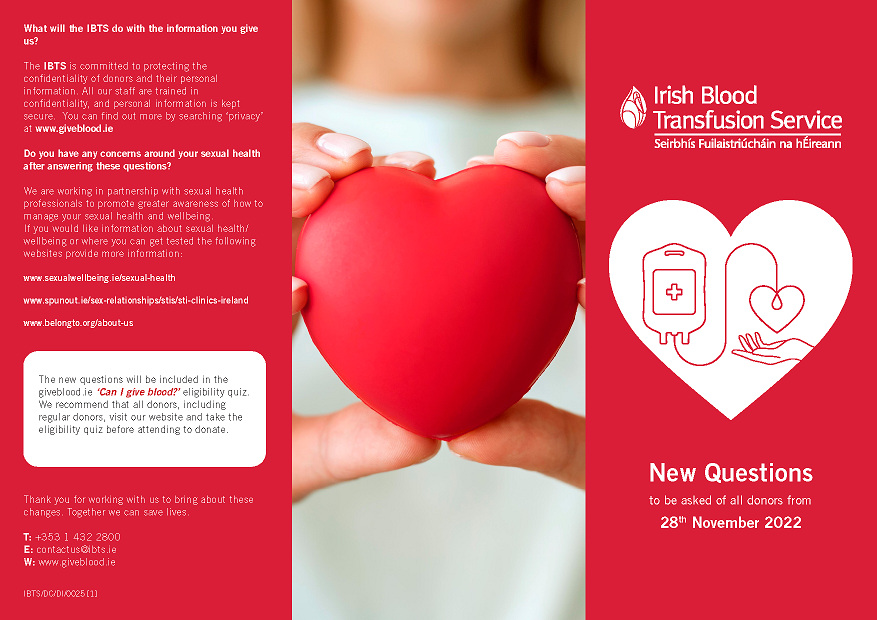Frequently Asked Questions on Individual Donor Risk Assessment
On 28th November 2022, the IBTS introduced a system of assessing each donor's eligibility to donate on a person-by-person basis in relation to sexual history and risk, rather than applying risks associated with specific populations which have previously excluded some potential donors. This system is called Individual Donor Risk Assessment (IDRA) and is similar to the system that was introduced in the UK Blood Services in 2021.
This video outlines the main changes:
Why are these changes being implemented?
Using a donor's indiviual behaviours to determine if that person is eligible to give blood makes the process fairer and more inclusive, while maintaining the safety of the blood supply. Every donor will be asked the same questions about their sexual activity, regardless of the donor's gender or sexual orientation or those of their partner.
Who decided what changes would be introduced?
These changes to the way the IBTS assesses risk of transfusion transmitted infections incorporate the key recommendations made by the Social Behaviours Review Group (SBRG) in 2021. This group was established to review the evidence base for donor eligibility in Ireland relating to behaviours, including sexual behaviours that may increase the risk of acquiring specific blood-borne infections.
What were the findings of the SBRG?
The SBRG identified several factors associated with a higher risk of acquiring blood-borne infection. These factors include: engaging in chemsex, having anal sex with a new or more than one partner and having a recent sexually transmitted infection.
Anal sex was identified as a higher risk activity than oral and vaginal sex, as the risk of transmitting HIV and other STIs is at least 5 fold higher.
They recommended that questions about these factors should be added to the donor questionnaire for all donors.
Will donors still be asked about STIs and PrEP/PEP?
We will continue to ask donors if they have ever had or been treated for syphilis or gonorrhoea.
If they have, they are not eligible to donate blood.
We will also continue to ask donors whether over the past four months, they have:
- taken medication to prevent HIV infection
- been diagnosed with a sexually transmitted infection or had sex with someone who has a sexually transmitted infection (excluding genital herpes and genital warts).
If the answer is yes, they will not be eligible to donate for four months.
What do the changes mean for current blood donors?
The changes mean that some donors who are currently eligible to donate will have to wait for four months before they can give blood. For example, a donor who has a new sexual partner with whom they are having anal sex will have to wait for four months before donating. This is because anal sex is a higher risk sexual activity than oral or vaginal sex. However, other potential donors who are eligible to donate at present will be able to do so.
What do the changes mean for gbMSM?
The changes mean that men who have oral sex with other men, but do not engage in anal sex will be eligible to donate without a deferral period (subject to other eligibility criteria). The changes will also mean that gay, bisexual and other men who have sex with men who are in a monogamous relationship for 4 months or more will be eligible to donate blood, even if they are having anal sex, as will their partners.
More information for LGBTQI+ Donors
What will the changes mean for transgender donors?
These changes apply to all blood donors, regardless of their gender or sexual orientation. Therefore, some transgender donors who were previously ineligible to donate blood will be able to do so.
Are there other changes we should be aware of?
Donors will no longer be asked gender-specific questions about their sexual activity. We have removed specific questions asking men if they have had oral or anal sex with other men in the past four months. We have also removed the question asking females if they have had sex in the past four months with a man who has ever had sex with another man.
We have also removed the question asking donors if their partners have had sex in parts of the world where HIV is very common.
Is the system working well in the UK?
Yes, it is working well. It is acceptable to donors and the blood collected is safe for patients. No cases of transfusion transmitted infection have been reported to the UK Blood Services since it began.
What monitoring will be carried out after the changes are introduced?
The IBTS constantly monitors rates of viral infections and syphilis in blood donors and any reported transfusion-transmitted infections in patients who have received blood. A compliance study will be undertaken to determine if donors are complying with the new donor eligibilty criteria.
Information Leaflet





